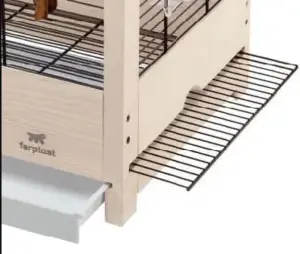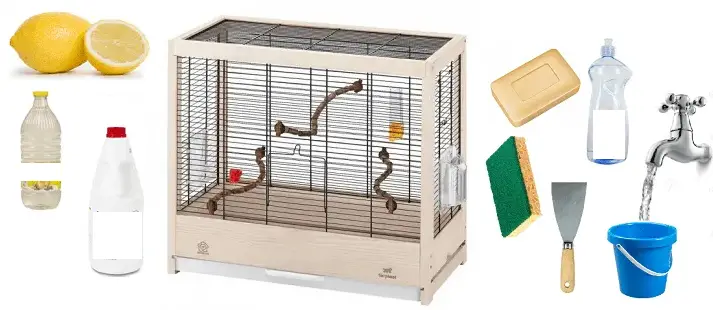how to clean a bird cage: Cleaning and disinfecting your parrot cage is a task that should not be neglected.
On the one hand to avoid odors and the proliferation of bacteria following the accumulation of droppings and the rest of the food and on the other hand for oneself order to live in a clean and healthy environment. In addition, mastering hygiene allows you to stay motivated with your parrots.
how often to clean bird cage
First of all, to evolve in a healthy environment, it is important to clean the cage or the aviary on a daily basis.
Especially if your parrot feeds on seeds in addition to various foods ( fruits and vegetables, etc. ). This causes liquid droppings and these foods spoil quickly.
Because of this, it is important to have an easy-to-clean cage to quickly get rid of the dirt without making this unrewarding task.
For me, a practical cage must absolutely have a removable tray or drawer. At this point, I will not make any concessions.
This makes it possible to change the bottom of the cage quickly and therefore no excuse to postpone cleaning.
Knowing that this cleaning will be done roughly so quickly.
 I have been using newspapers as a cage bottom for years.
I have been using newspapers as a cage bottom for years.
I find it quite hygienic and very absorbent. You can also use anise sand.
If you want to prevent your birds from reaching the bottom, opt for a cage with a dividing grid at the bottom of the cage.
Drinkers and feeders must be washed and disinfected daily to prevent the proliferation of bacteria, especially in hot weather. The ideal would be to have several clean drinkers and feeders to rotate to save time.
For dust and seed peels, I advise you to use a vacuum cleaner instead of wrapping the cage with transparent film.
Weekly cleaning
For my part, each week I devote a full afternoon (often Sunday) to perform a complete cleaning of all my facilities.
For each cage or aviary, I place the parakeets in a transport bag or temporary cage the time to do a thorough cleaning of the entire installation and its accessories.
This step is very important, even if sometimes it doesn’t seem necessary. It is essential to prepare the ground before starting the disinfection.
Disinfecting without cleaning it first will have less of an impact on fighting bacteria and parasites.
So the entire cage must be cleaned (everything goes there), the bars, the walls, the tray, and its removable drawer but also the perches and other accessories …
Once the facilities are cleaned, I take care of dusting the entire area. In view of the volume of the room, I recently invested in a powerful wet and dry vacuum cleaner, and frankly, the rendering is great.
Best way to clean bird cage

Clean bird cage
It is important to first clean the cage and its components before proceeding with the disinfection. We must therefore stick to the principle that we can only disinfect what is clean.
For cleaning, I take the green side of the sponge, washing up liquid (or natural scientist) and elbow grease.
Often and before starting, I first scrape the encrusted residue with a spatula. It’s my favorite weapon. Finally, I do not hesitate to rinse everything well with clear water.
To disinfect the cage
So after cleaning, we can now proceed to disinfection. For this, several solutions are available to us but I will quote only 3:
-
The lemon:
I start with my favorite, the lemon. Lemon juice is a natural disinfectant that eliminates bacteria and microbes, plus it is antiseptic.
I first prepare a solution of lemon juice and water, then I let the drinkers, feeders, and other accessories trickle into this mixture to disinfect them. Then I rinse. It can also be used to disinfect the rest of the cage.
-
White vinegar :
The second disinfectant is the white vinegar (antibacterial) that I apply on a sponge to then pass on the walls. I let it act, then I rinse with plenty of water. This product is easy on sale in supermarkets.
-
Diluted bleach:
We can also use diluted bleach without danger for our birds provided that all the washed parts are thoroughly rinsed with clean water. It has the advantage of being very efficient and inexpensive.
Important: Never mix bleach and white vinegar. Indeed, the mixture of these two products causes a chemical reaction that turns out to be toxic due to the release of chlorine gas. It is both dangerous for us and for our birds.
How to Clean Your Bird’s Cage!
SOURCE: ElleAndTheBirds

